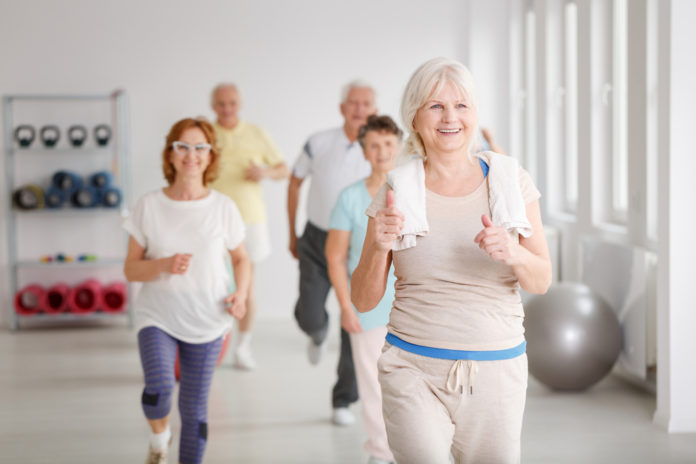Exercise is encouraged throughout the lifespan and is does not stop with age. In fact, starting or continuing a workout journey is considered safe while offering great benefits to seniors.
Benefits often outweigh the risks, exercise for the elderly is highly encouraged by healthcare professionals across the board. Really, an active lifestyle promotes longer, healthier living.
The Benefits of Senior Workouts & Exercise
The benefits of exercise for seniors are diverse and support physical, mental, emotional, and, truly, overall health.
1. Resistance training preserves lean body mass.
As the body ages, it generally undergoes many changes. People often experience the exchange of lean muscle tissue to fat mass. Unfortunately, this can result in a declined metabolism, making it tougher to lose weight yet easier to gain it.
Regular strength training or weight-bearing activities can preserve lean body mass, ultimately offering metabolic regulation. Preserving lean body mass also preserves strength, in turn increasing independence for years to come.
2. Aerobic exercise promotes heart and lung health.
Aerobic exercise is encouraged to promote both heart and lung health. Supporting the two strengthens the body’s ability to continue supplying the body with oxygen-rich blood.
Exercise also supports healthy blood pressure levels, in which hypertension risk increases with age. Controlled BP reduces the risk of heart attack, stroke, dementia, kidney failure, and other severe or potentially fatal health conditions.
3. Regular exercise helps boost the immune system.
Exercise helps boost the immune system, the body’s primary defense for fighting “foreign” invaders that can cause infection and sickness.
And even if an illness did arise, a strong immune system encourages a quicker and easier recovery.
4. Weight-bearing exercise supports strong bones.
Weight-bearing activities protect against bone loss, subsequently reducing the risk of osteoporosis. Conserving bone density reduces the risk of bone fractures and protect against falls.
Seniors should still include calcium and vitamin D sources to support strong bones, taking supplements as needed.
5. Being active encourages digestive and bowel health.
Along with obtaining adequate fiber and water intake, regular exercise can encourage bowel health.
Staying active helps stimulate the digestive tract for regular bowel movements. In fact, being sedentary is a major risk factor for constipation!
6. Balance exercises namely nurture balance.
Poor balance may cause dizziness, lightheadedness, and feelings of the room spinning. Such circumstances bring a large portion of older adults to seek out professional help.
Exercise can improve and nurture good balance and prevent the risk of falls. Preventing falling, in turn, lessens the likelihood of minor or major injuries.
7. An active lifestyle fosters brain function and health.
Along with physical health, exercise can offer great benefits to the brain. Initial benefits of exercise can boost moods and reduce feelings of stress, sadness, and anxiety.
Regular exercise has further shown to prevent memory loss while sharpening concentration. It can also prevent cognitive decline and the progression of dementia.
How to Start an Exercise Program for Seniors
Starting an exercise program should begin with consulting with a doctor. Easing into various forms of exercise and enjoying the process is helpful, too, for long-term success.
1. Consult with a doctor first.
Always talk with your primary care provider before jumping into any new exercise regimen. This especially serves true if managing a health condition.
Attending physical therapy or working with a personal trainer can also help ensure safe movements. This prevents injury and optimizes each function.
2. Embrace all types of exercises.
Like the diet, there is not one single exercise proponent that provides everything the body may need.
A complete workout regimen mostly includes three types of exercise, including cardio, strength training, and balance exercises. Including each variety offers the best benefits to total health.
Likewise experiment with different kinds of each. For instance, there are many forms of cardio, including brisk walking and dance. Tai chi is one of the best balance exercises for seniors as well.
3. Easy into any workout program or regimen.
Especially if just starting a workout routine, it is imperative to start small to prevent injury. Begin an exercise regimen with a few days each week, increasing the frequency as tolerated.
Use your own body weight or a comfortable volume in the initial stages. As workouts start to seem simple or less strenuous, more weight and repetitions can be added.
3. Avoid overdoing any exercise.
More is not always better, especially when it comes to exercise. In fact, most research supportive of exercise calls for moderation. This is because too much of or intensity can actually increase inflammation within the body.
To likewise maintain a balanced workout regimen, focus on all parts of the body. Include both lower and upper body days and allow it to rest and recover multiple times per week.
4. Be realistic with goals and standards.
It is undoubtedly admirable to make goals and give it your all and best efforts. However, it is important to be realistic with what your body can do.
The body undergoes large changes as age advances, so keep it working to its best function by not overdoing it. All-in-all, any movement is more beneficial than doing without!
5. Have fun and enjoy a newfound active lifestyle.
But most importantly, get out and have fun! Exercising does not have to be so serious, despite the serious benefits it offers. One of the greatest aspects of exercise is the heightening of mood, subsequently enhancing quality of life.
So get out with close friends, loved ones, and anyone else who may join you on your workout venture!






